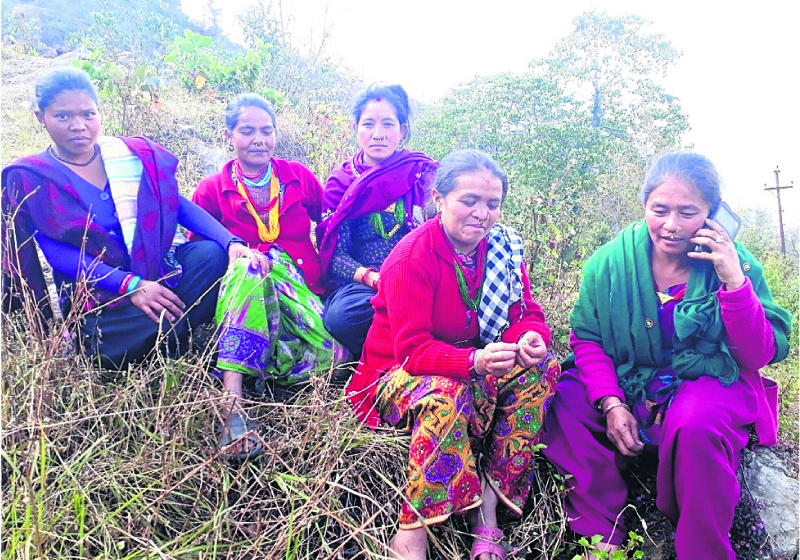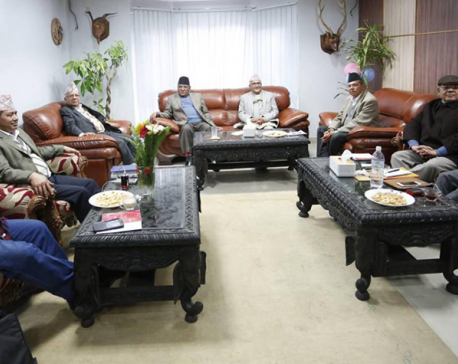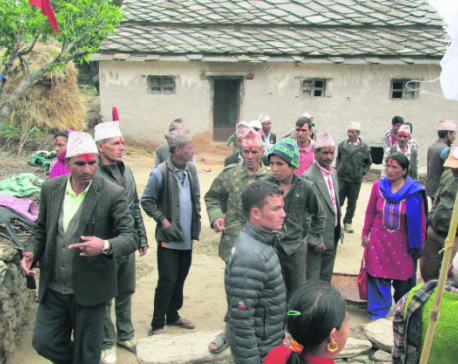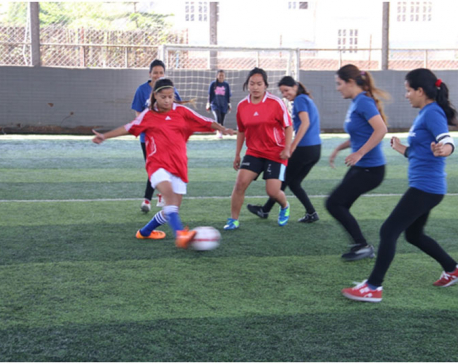
OR
Parties struggle as women leaders are scarce among Thamis
Published On: April 8, 2017 08:41 AM NPT By: Ramesh Khatiwada

DOLAKHA, April 7: Sita Thami, a woman from the Thami indigenous community, is extremely busy these days. She has no time to eat, sleep or to attend household chores, because of the local level elections campaign.
“I don’t have time for attending my domestic or personal needs. Mostly I don’t get enough time to sleep or eat. Meetings, seminars, campaigning are keeping me too busy,” said Thami, a Nepali Congress cadre from Babare village.
Thami was returning home after attending four meetings in the evening on Tuesday when this scribe met her at a crossroad in her village. She was sweating and looked exhausted. “We have another meet scheduled for later today. We are working hard to rally support in favor of our candidates. The goal is to sweep the election results on our party’s side.”
Though she has been actively engaged in politics, only a rare few women from her community are affiliated to any political parties. She has been supporting Nepali Congress for many years and this time, she says, she is going to leave no stone unturned to ensure victory for the party. Through out the day and most of the evening she has been holding meetings after meetings in the locality in an effort to win their votes for the party’s candidates. However, she does not feel that she has the qualities to take up a lead role. Such desires do not come to her mind, she says.
Since the beginning, I have always helped the party. Never thought of taking up any official leadership position. Now I feel that such positions are not for me,” she said laughingly. “I will give my hundred percent to the party in this election, too. I enjoy it.”
Thami is among other few women from her community who are associated with Nepali congress. Though they love giving all their time for the party, they never think of taking up any official leadership position.
Thami community is scattered in six wards of the Kalinchowk Municipality. As per the Census 2011, this marginalized community’s total population in the municipality is around 8,000. But so far not even a single woman from this community has taken any official leadership position in any political party.
The election law has mandated that either chief or the deputy chief of Rural Municipality or Municipality has to be a woman. Because of this, political parties have been trying to find women candidates to fill these slots. But they are finding it hard to have women who are willing to take such roles.
The scarcity is even more acute in communities like that of the Thami. Party officials say that even women party members from the community who have actively supported their party for long time are reluctant to take up a leading role.
Laxmi Thami and Dolma Thami of Lipaling are district committee members of the CPN - (Maoists - Central). There is no representation of Thami women in the district committees of Nepali Congress and CPN - UML, though some are engaged in their sister organizations.
“Some women from the community are associated with one or other political party. But no one is willing to file candidacy for ward president or vice president. They show sheer nervousness,” said Binkumar Thami, coordinator of CPN - UML’s District Secretariat. “None have expressed confidence to file candidacy for ward member or chairperson. So we are still seeking women candidates that are willing to take up leadership roles,” he added.
Jayram Shrestha, Nepali Congress politician, also shared similar situation. He said that even well educated women are not willing to take leadership roles. “Basically educated women are employed within the locality or elsewhere. The ones that are not employed prefer hunting jobs rather than getting into politics,” Shrestha said. “As for women who are illiterate or just literate, they work hard for party but their political awareness in not so high,” he added.
In contrast, Thami men are quite active in politics, according to party leaders. They opined that this might be because of the patriarchal nature of the society.
You May Like This

Left parties struggle to accommodate key leaders
KATHMANDU, FEB 18: Despite a supposed breakthrough over the issue of leadership and organization, UML and the CPN (Maoist Center)... Read More...

Too many candidates in big parties, small parties struggle to find aspirants
BAGLUNG, April 25: Major political parties are having hard time to select their candidates from the pool of the aspirant candidates... Read More...

Futsal for the women, by the women and of the women!
KATHMANDU, March 19: WE United Project launched the Mahila Premier League (MPL) on March 18 at Grassroots Recreational Center in Mandikhatar. ... Read More...










Just In
- NRB introduces cautiously flexible measures to address ongoing slowdown in various economic sectors
- Forced Covid-19 cremations: is it too late for redemption?
- NRB to provide collateral-free loans to foreign employment seekers
- NEB to publish Grade 12 results next week
- Body handover begins; Relatives remain dissatisfied with insurance, compensation amount
- NC defers its plan to join Koshi govt
- NRB to review microfinance loan interest rate
- 134 dead in floods and landslides since onset of monsoon this year








Leave A Comment